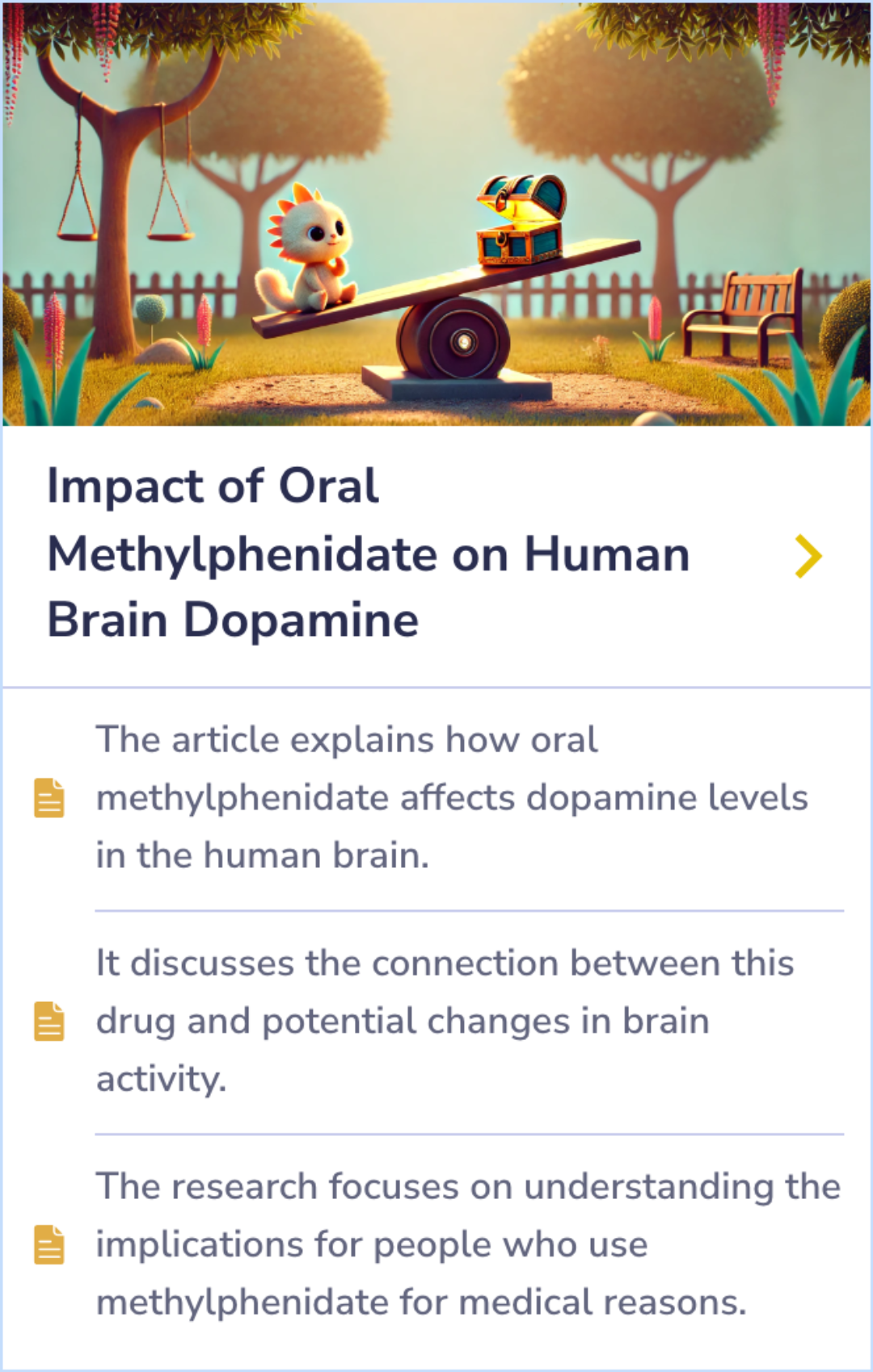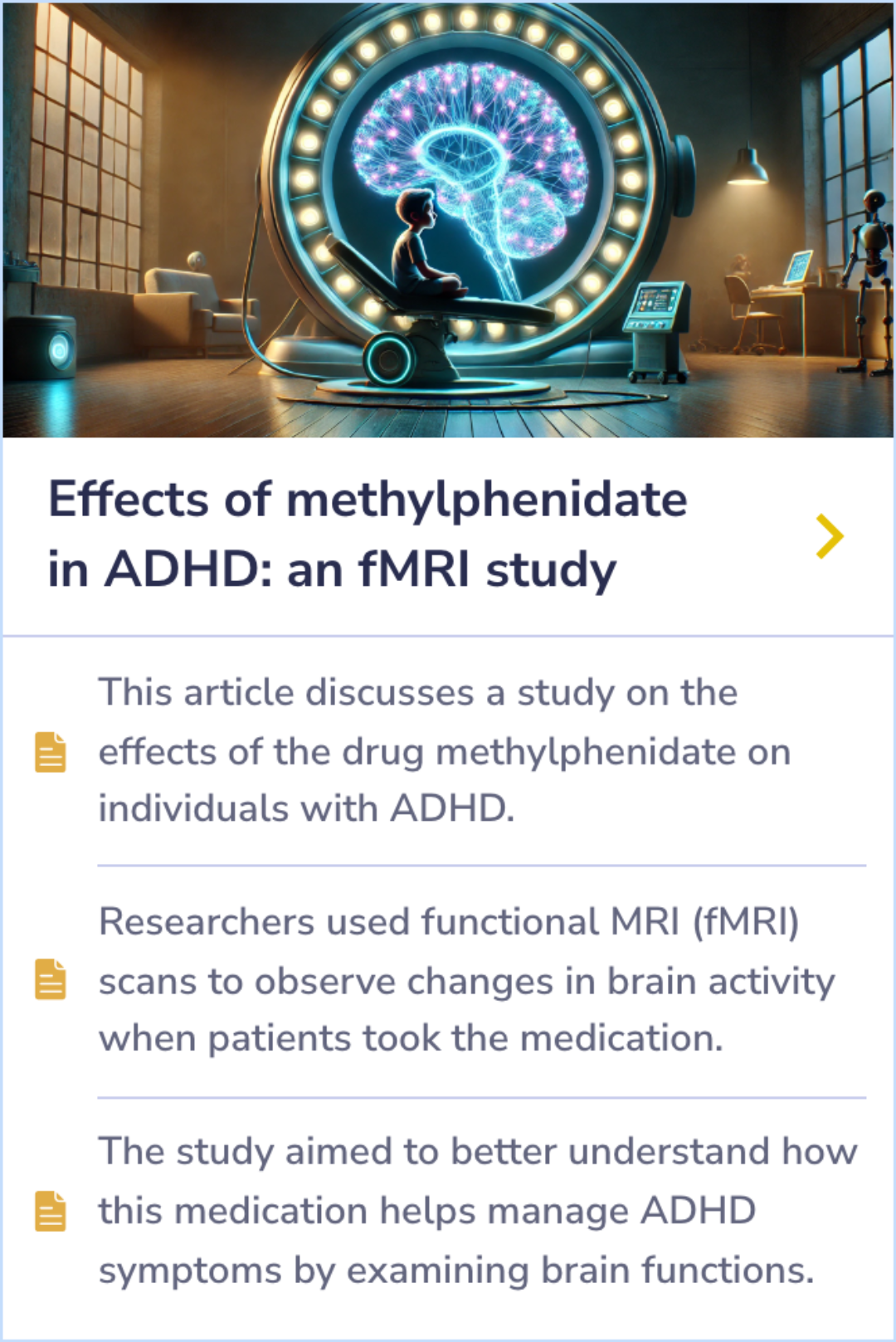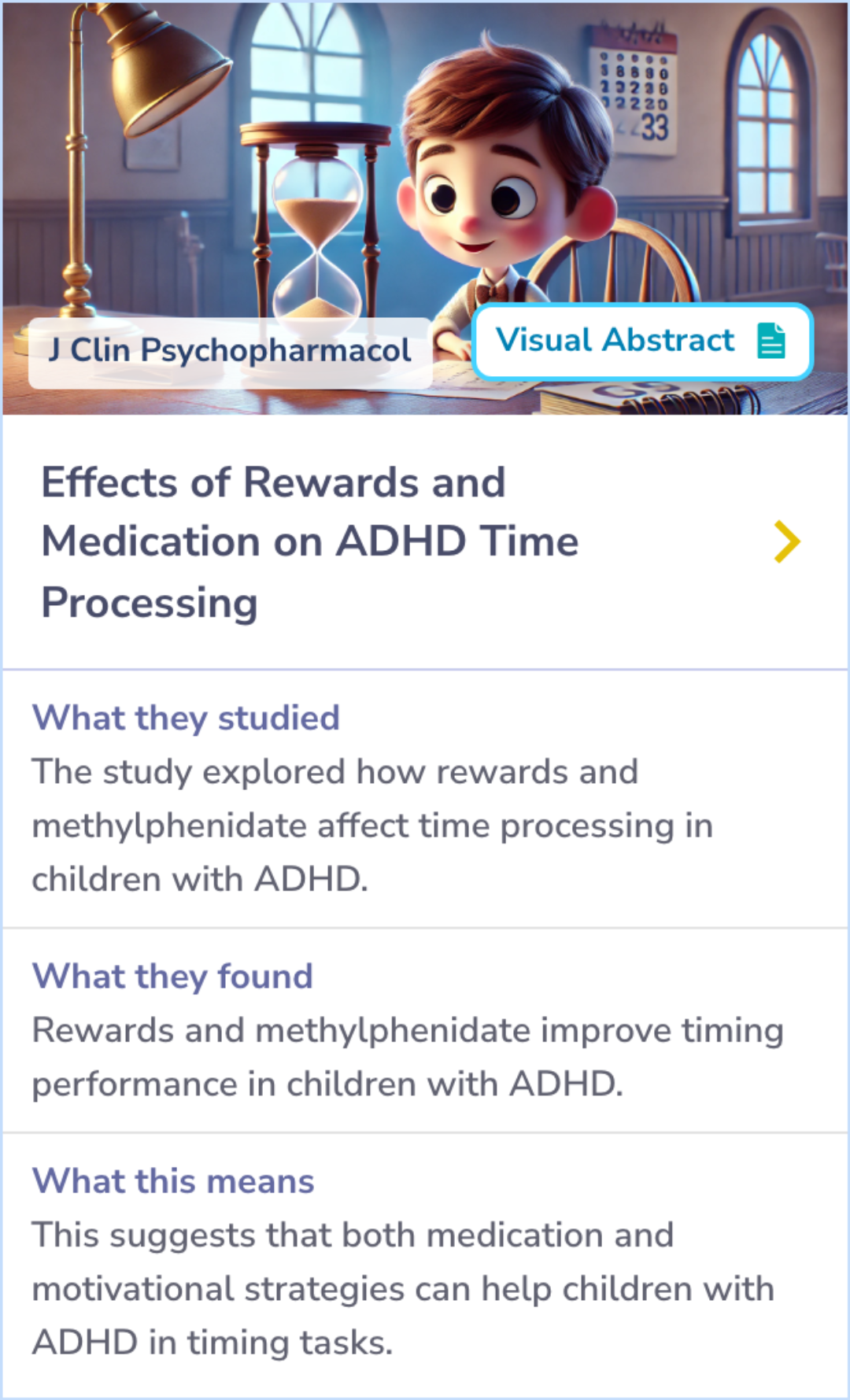Ritalin
Evidence Based Answers
Studies on the effect of Methylphenidate on Neurotransmitters in the Brain
Studies show methylphenidate raises dopamine and norepinephrine in brain regions linked to attention and impulse control, with possible changes over long-term use.
Published: October 25, 2024
Click to explore a section:
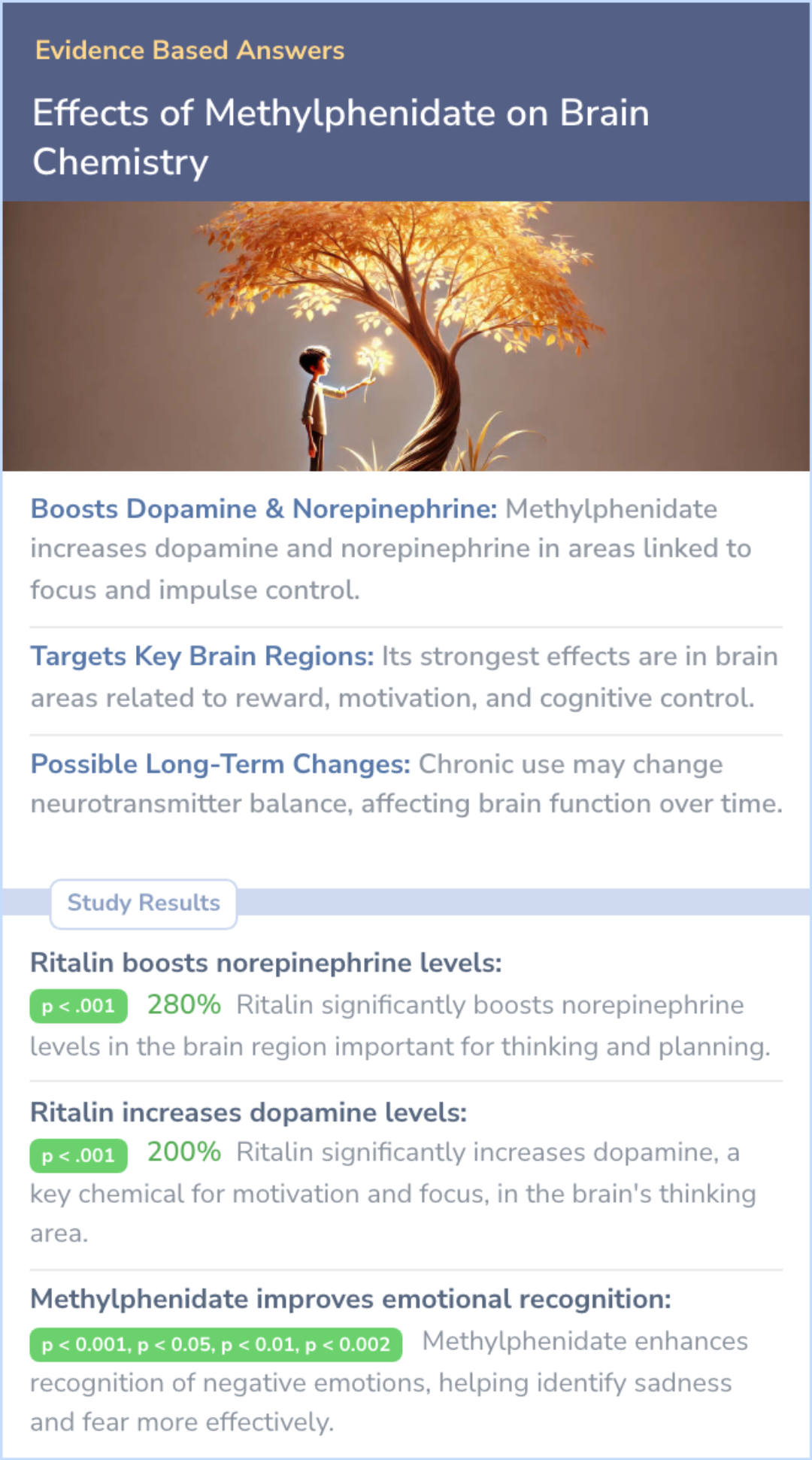
Methylphenidate increases neurotransmitters in key brain areas, affecting attention and impulse control, with potential long-term effects on brain chemistry.
Studies Summary
🔍
Selective Increase in Dopamine and Norepinephrine
Researchers found that methylphenidate, at low doses, increases dopamine and norepinephrine levels in the prefrontal cortex, an area key to attention and working memory, without affecting other brain regions.
🔒
Blocking Dopamine Reuptake
Methylphenidate works by blocking the reuptake of dopamine, significantly increasing its levels in brain areas like the striatum and prefrontal cortex. This action is closely tied to its effectiveness in treating ADHD.
💡
Norepinephrine Transporter Occupancy
Studies revealed that methylphenidate reduces norepinephrine transporter binding, especially at clinical doses, suggesting its role in managing ADHD symptoms through effects on norepinephrine.
Highly Cited Studies
Long term Effects of Methylphenidate in Adults
Peer Reviewed Study 1
Methylphenidate's Selective Action on PFC Neurotransmitters
Peer Reviewed Study 2
Methylphenidate’s Effect on Dopamine in the Brain
Peer Reviewed Study 3
Methylphenidate's Effect on Brain Neurotransmitters: Norepinephrine Transporter Occupancy
Peer Reviewed Study 4
Methylphenidate's Impact on Neurotransmitter-Influenced Brain Metabolism
Peer Reviewed Study 5
Methylphenidate Enhances Task Engagement by Elevating Dopamine
Peer Reviewed Study 6
Methylphenidate's Impact on Neurotransmitters
Background: How Methylphenidate Affects Dopamine and Norepinephrine
Methylphenidate, commonly known as Ritalin or Concerta, primarily works by blocking the reuptake of two key neurotransmitters: dopamine and norepinephrine. This action leads to an increase in their levels in the brain, especially in areas like the striatum and prefrontal cortex, which are crucial for attention and impulse control. These effects help manage ADHD symptoms, highlighting the medication's role in enhancing focus and reducing hyperactivity.
However, the exact mechanism is still not fully understood, reflecting the complexity of the brain's neurotransmitter systems.
However, the exact mechanism is still not fully understood, reflecting the complexity of the brain's neurotransmitter systems.
“
Source Quotes:
Methylphenidate blocks the reuptake of two neurotransmitters, norepinephrine (NE) and dopamine, in presynaptic neurons.
Methylphenidate binds to the dopamine transporter in the presynaptic cell membrane, blocking reuptake of dopamine and causing a resultant increase in extracellular dopamine levels.,Methylphenidate also influences norepinephrine levels by blocking its reuptake, which can contribute to enhanced focus and alertness.
Background: Methylphenidate’s Selective Impact on Brain Regions
Methylphenidate doesn’t affect all parts of the brain equally. Its impact is particularly strong in areas like the striatum, nucleus accumbens, and prefrontal cortex. These regions are involved in functions such as reward, motivation, and cognitive control, which are essential for managing ADHD symptoms.
The selective action of methylphenidate on these brain areas helps explain why it is effective in treating ADHD, as these regions are directly associated with the behaviors targeted by the medication.
The selective action of methylphenidate on these brain areas helps explain why it is effective in treating ADHD, as these regions are directly associated with the behaviors targeted by the medication.
“
Source Quotes:
In the rat, methylphenidate inhibits dopamine reuptake in the striatum, nucleus accumbens, olfactory tubercle, and prefrontal cortex.,Microdialysis studies have confirmed the in vivo ability of methylphenidate to increase extracellular dopamine levels in the striatum and nucleus accumbens.
Background: Long-Term Changes in Neurotransmitter Systems with Methylphenidate
Long-term use of methylphenidate may lead to changes in neurotransmitter systems, particularly in the density of dopamine transporters. Research indicates that chronic use might alter the brain's natural balance of neurotransmitters, which could have lasting effects on how the brain functions.
These findings shed light on the potential risks and benefits of long-term ADHD treatment with methylphenidate, emphasizing the need for ongoing research to fully understand the implications of prolonged use.
These findings shed light on the potential risks and benefits of long-term ADHD treatment with methylphenidate, emphasizing the need for ongoing research to fully understand the implications of prolonged use.
“
Source Quotes:
Long-term administration of psychostimulants (including MPH) may reduce structural and functional abnormalities observed in the brains of individuals with ADHD.
Long-term use of methylphenidate may lead to changes in neurotransmitter systems, particularly in the density of dopamine transporters.
Peer Reviewed Study
Study: Methylphenidate's Selective Action on PFC Neurotransmitters
This study explores how low doses of methylphenidate (MPH), used to treat ADHD, selectively increase dopamine (DA) and norepinephrine (NE) in the prefrontal cortex (PFC), an area key to cognitive functions like attention and working memory.
Researchers used rats and found that low doses of MPH elevated NE and DA in the PFC without significantly affecting other brain regions.
This suggests that MPH's therapeutic effects on cognition may be due to its targeted action on neurotransmitters in the PFC, reducing the likelihood of side effects like hyperactivity.
Researchers used rats and found that low doses of MPH elevated NE and DA in the PFC without significantly affecting other brain regions.
This suggests that MPH's therapeutic effects on cognition may be due to its targeted action on neurotransmitters in the PFC, reducing the likelihood of side effects like hyperactivity.
author
Berridge CW, Devilbiss DM, Andrzejewski ME, Arnsten AF, Kelley AE, Schmeichel B, Hamilton C, Spencer RC
journal
Biol Psychiatry
Date Published
2006 Nov 15
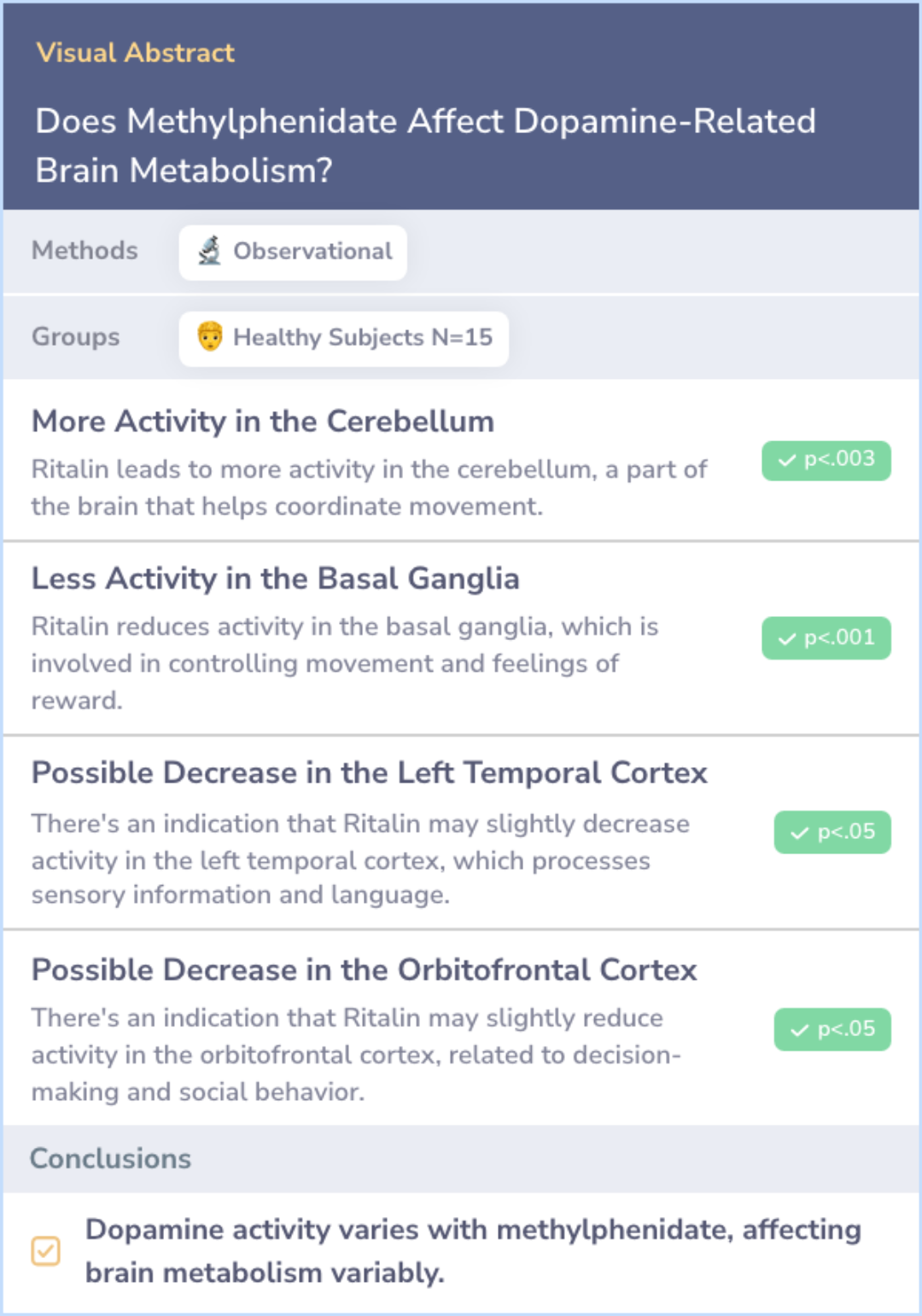
Peer Reviewed Study
Study: Methylphenidate’s Effect on Dopamine in the Brain
This research examined how methylphenidate, often prescribed for ADHD, affects dopamine in the brain by blocking the dopamine transporter, which increases dopamine levels.
Using PET scans, the study showed that methylphenidate significantly raises extracellular dopamine in the striatum, an area linked to attention and reward.
These findings help explain the neurochemical mechanisms of methylphenidate, showing how it can improve attention and reduce distractibility.
Using PET scans, the study showed that methylphenidate significantly raises extracellular dopamine in the striatum, an area linked to attention and reward.
These findings help explain the neurochemical mechanisms of methylphenidate, showing how it can improve attention and reduce distractibility.
author
Volkow ND, Wang G, Fowler JS, Logan J, Gerasimov M, Maynard L, Ding Y, Gatley SJ, Gifford A, Franceschi D
journal
J Neurosci
Date Published
2001 Jan 15

Peer Reviewed Study
Study: Methylphenidate's Effect on Brain Neurotransmitters: Norepinephrine Transporter Occupancy
This study looked at how methylphenidate (Ritalin/Concerta) affects the norepinephrine transporter (NET) in the brain using PET imaging.
The results showed that methylphenidate reduces NET binding in a dose-dependent manner, with significant effects at clinical doses.
These findings provide insights into how methylphenidate works, suggesting that its therapeutic effects in ADHD may involve NET inhibition, in addition to its effects on dopamine.
The results showed that methylphenidate reduces NET binding in a dose-dependent manner, with significant effects at clinical doses.
These findings provide insights into how methylphenidate works, suggesting that its therapeutic effects in ADHD may involve NET inhibition, in addition to its effects on dopamine.
author
Hannestad J, Gallezot JD, Planeta-Wilson B, Lin SF, Williams WA, van Dyck CH, Malison RT, Carson RE, Ding YS
journal
Biol Psychiatry
Date Published
2010 Nov 1

Peer Reviewed Study
Study: Methylphenidate's Impact on Neurotransmitter-Influenced Brain Metabolism
Methylphenidate affects brain metabolism by influencing neurotransmitters like dopamine, with varied effects across different people.
The study found that methylphenidate consistently increases metabolism in the cerebellum, a brain region influenced by dopamine, but has mixed effects on other regions.
The link between dopamine D2 receptors and changes in metabolism suggests that dopamine activity is partly responsible for how methylphenidate works.
The study found that methylphenidate consistently increases metabolism in the cerebellum, a brain region influenced by dopamine, but has mixed effects on other regions.
The link between dopamine D2 receptors and changes in metabolism suggests that dopamine activity is partly responsible for how methylphenidate works.
author
Volkow ND, Wang GJ, Fowler JS, Logan J, Angrist B, Hitzemann R, Lieberman J, Pappas N
journal
Am J Psychiatry
Date Published
1997 Jan

Peer Reviewed Study
Study: Methylphenidate Enhances Task Engagement by Elevating Dopamine
Research investigated how methylphenidate affects dopamine, a neurotransmitter associated with motivation, during academic tasks.
The study used imaging to observe dopamine increases when subjects were given methylphenidate while performing tasks, showing significant boosts in dopamine levels.
These findings suggest that methylphenidate may enhance interest in tasks, potentially improving attention by making them more engaging.
The study used imaging to observe dopamine increases when subjects were given methylphenidate while performing tasks, showing significant boosts in dopamine levels.
These findings suggest that methylphenidate may enhance interest in tasks, potentially improving attention by making them more engaging.
author
Volkow ND, Wang GJ, Fowler JS, Telang F, Maynard L, Logan J, Gatley SJ, Pappas N, Wong C, Vaska P, Zhu W, Swanson JM
journal
Am J Psychiatry
Date Published
2004 Jul

Peer Reviewed Study
Study: Methylphenidate's Impact on Neurotransmitters
This study compared the effects of methylphenidate and MDMA (ecstasy) on neurotransmitters, highlighting their different impacts on mood and concentration.
Methylphenidate was shown to enhance focus more than MDMA, but the drugs differ in how they affect emotional recognition.
The study also found that while both drugs influence neurotransmitter systems, they do not alter each other's pharmacokinetics, but may increase adverse cardiovascular effects when combined.
Methylphenidate was shown to enhance focus more than MDMA, but the drugs differ in how they affect emotional recognition.
The study also found that while both drugs influence neurotransmitter systems, they do not alter each other's pharmacokinetics, but may increase adverse cardiovascular effects when combined.
author
Hysek CM, Simmler LD, Schillinger N, Meyer N, Schmid Y, Donzelli M, Grouzmann E, Liechti ME
journal
Int J Neuropsychopharmacol
Date Published
2014 Mar

Key Takeaways
Conclusions
Methylphenidate (often known as Ritalin or Concerta) works by increasing neurotransmitter levels, especially dopamine and norepinephrine, in the brain's regions crucial for attention and impulse control. By blocking their reuptake, it enhances focus, making it widely used for managing ADHD symptoms.
Studies reveal that its action is selective, with profound effects in the prefrontal cortex and striatum, providing insights into its therapeutic benefits and potential side effects. Though the complete mechanisms remain only partially understood, its impact on neurotransmitter transporters offers a window into its operation.
Studies reveal that its action is selective, with profound effects in the prefrontal cortex and striatum, providing insights into its therapeutic benefits and potential side effects. Though the complete mechanisms remain only partially understood, its impact on neurotransmitter transporters offers a window into its operation.

Evidence Summary
Exploring Methylphenidate's Influence on Dopamine and Brain Activity
The article investigates how methylphenidate, taken orally, affects dopamine levels and alters brain activity. Methylphenidate is noted for impacting dopamine, a neurotransmitter involved in attention and impulse control. Through examining brain activity changes, the article highlights the medication's influence on users.
The research offers insights into its effects on individuals using methylphenidate for medical reasons, particularly its impact on neurotransmitters like dopamine.
The research offers insights into its effects on individuals using methylphenidate for medical reasons, particularly its impact on neurotransmitters like dopamine.
Evidence Summary
Imaging Brain Activity in ADHD with Methylphenidate
Researchers use fMRI scans to track how methylphenidate alters brain activity in people with ADHD. These scans reveal changes in brain function, demonstrating how the medication manages symptoms. By observing the brain's reaction, scientists gain insights into the drug's effects.
The study showcases the practical application of brain imaging techniques to analyze the functional impact of ADHD medication on individuals taking the drug.
The study showcases the practical application of brain imaging techniques to analyze the functional impact of ADHD medication on individuals taking the drug.
Evidence Summary
Enhancing Timing in ADHD: Rewards vs. Medication
Children with ADHD often struggle with timing tasks, which this study sought to address by examining the effects of rewards and medication. With three different task conditions, children both with and without ADHD took part in tests that revealed interesting patterns.
Findings showed that both reinforcement and methylphenidate help improve their timing accuracy, although combining them didn’t offer additional benefits. This highlights how different interventions can affect children with ADHD.
Findings showed that both reinforcement and methylphenidate help improve their timing accuracy, although combining them didn’t offer additional benefits. This highlights how different interventions can affect children with ADHD.
